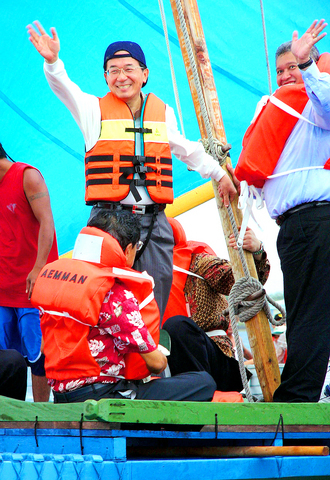During the second day of his Marshall Islands trip yesterday, President Chen Shui-bian (陳水扁) said that Beijing and Taipei should learn to trust each other in order to prevent a military confrontation. He also said that he is always willing to negotiate with the Chinese government under the principles of democracy and peace.
"The door to resolve cross-strait problems is always open if Beijing is willing to follow the principles of democracy and peace and talk to us," Chen said. "To affirm eternal peace between Beijing and Taipei is not something that can be accomplished immediately. But if we progress step by step, it will eventually come about."
Chen made his remarks while he was addressing the Marshall Islands' Senate yesterday morning. The president said that war results in suffering, hatred and sorrow.

PHOTO: CNA
"Only peace will bring about prosperity," the president said.
Chen also assured the Marshallese people that Taiwan will always be its friend and keep helping the country develop.
Chen addressed the Marshallese Senate around 10am yesterday morning. He said that both Taiwan and the Marshall Islands are maritime countries and thus share a kinship. Chen added Taiwan and the Marshall Islands love peace, and the two country's people will work hand in hand and help each other.
About 30 of the 33 Marshall Islands senators were present at Chen's address. Jally Morris, a 69-year-old local pastor who joined yesterday's event, said that Chen's visit to the Marshallese Senate is a milestone for the country.
"Chen is the first foreign leader to address the senate. It is the first time we have had so many reporters in the house to cover congressional news," Morris said.
To welcome Chen, the senate's official choir sang before and after his speech. The senators joined in the singing and assumed different roles. Some sang as tenors, while others sounded off as baritones and basses.
"Most Marshallese people are natural singers because we sing a lot during church services," Morris said.
After the speech, Chen joined an outdoor parade in front of the government building to celebrate the Marshall Islands' Constitution Day (Independence Day). Occasional rain interrupted the event, but the festivities were not cancelled.
In the afternoon, Chen reiterated his plan to help the Marshall Islands in its economic development.
"We will help the country build dry docks so the Marshall Islands can become a center of ship maintenance and repair industry in the region," Chen said.
Dry docks are maritime repair houses where a ship can be lifted out of the water and repaired.
The president also said that Taiwan will help the country develop its tourism industry.
Giff Johnson, editor-in-chief of the country's weekly newspaper, the Marshall Islands Journal, asked Chen whether the occasional rain upset him during the parade. Chen said that fortune tellers told him that he "needs water in his life" since part of his first name means "water" in Chinese. Thus, it is natural for him to be in the rain, he said.
"A rainbow or sunshine always shows up after the rain. That means things always get better after we go through difficulties," Chen said.
also see story:
Chen takes Note on board Taiwanese frigate

Conflict with Taiwan could leave China with “massive economic disruption, catastrophic military losses, significant social unrest, and devastating sanctions,” a US think tank said in a report released on Monday. The German Marshall Fund released a report titled If China Attacks Taiwan: The Consequences for China of “Minor Conflict” and “Major War” Scenarios. The report details the “massive” economic, military, social and international costs to China in the event of a minor conflict or major war with Taiwan, estimating that the Chinese People’s Liberation Army (PLA) could sustain losses of more than half of its active-duty ground forces, including 100,000 troops. Understanding Chinese

The Ministry of Foreign Affairs (MOFA) yesterday said it is closely monitoring developments in Venezuela, and would continue to cooperate with democratic allies and work together for regional and global security, stability, and prosperity. The remarks came after the US on Saturday launched a series of airstrikes in Venezuela and kidnapped Venezuelan President Nicolas Maduro, who was later flown to New York along with his wife. The pair face US charges related to drug trafficking and alleged cooperation with gangs designated as terrorist organizations. Maduro has denied the allegations. The ministry said that it is closely monitoring the political and economic situation

UNRELENTING: China attempted cyberattacks on Taiwan’s critical infrastructure 2.63 million times per day last year, up from 1.23 million in 2023, the NSB said China’s cyberarmy has long engaged in cyberattacks against Taiwan’s critical infrastructure, employing diverse and evolving tactics, the National Security Bureau (NSB) said yesterday, adding that cyberattacks on critical energy infrastructure last year increased 10-fold compared with the previous year. The NSB yesterday released a report titled Analysis on China’s Cyber Threats to Taiwan’s Critical Infrastructure in 2025, outlining the number of cyberattacks, major tactics and hacker groups. Taiwan’s national intelligence community identified a large number of cybersecurity incidents last year, the bureau said in a statement. China’s cyberarmy last year launched an average of 2.63 million intrusion attempts per day targeting Taiwan’s critical

‘SLICING METHOD’: In the event of a blockade, the China Coast Guard would intercept Taiwanese ships while its navy would seek to deter foreign intervention China’s military drills around Taiwan this week signaled potential strategies to cut the nation off from energy supplies and foreign military assistance, a US think tank report said. The Chinese People’s Liberation Army (PLA) conducted what it called “Justice Mission 2025” exercises from Monday to Tuesday in five maritime zones and airspace around Taiwan, calling them a warning to “Taiwanese independence” forces. In a report released on Wednesday, the Institute for the Study of War said the exercises effectively simulated blocking shipping routes to major port cities, including Kaohsiung, Keelung and Hualien. Taiwan would be highly vulnerable under such a blockade, because it